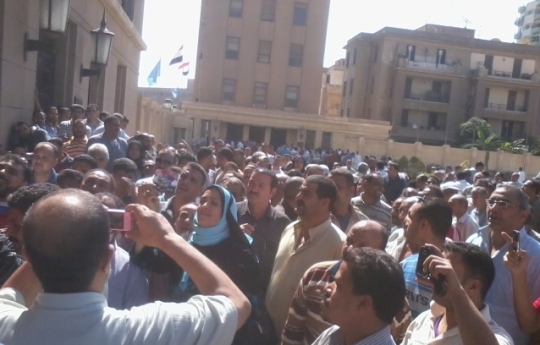Mahallah textile workers continue strike, ignoring minister's ultimatum

CAIRO, Oct. 29 (Aswat Masriya)- The strike at Mahallah’s Misr Spinning and Weaving Company, Egypt's largest textile company, continued Thursday for a ninth day, with workers insisting on getting assurances about the 10 percent social bonus and food allowance, before resuming production.
A source inside the company, who preferred to remain anonymouse for fear of reprisal, said that workers will continue striking until management present a written document guaranteeing the company's committement to deliver their financial demands.
He noted that companies in the same sector had received the 10 percent, including Helwan’s Spinning and Weaving Company, al-Siouf Spinning and Weaving Company in Alexandria, Stia Spinning and Weaving Company in Alexandria and Upper Egypt Spinning and Weaving Company.
Dalia Moussa, workers' coordinator at the Egyptian Center of Economic and Social Rights (ECESR), said “this pushed the workers in Mahalla to continue their strike”.
A total of 17,000 workers started their strike on October 21 to demand an allowance promised by President Abdel Fattah al-Sisi in a September decree, effective retroactively starting July.
However, the Finance Ministry issued a set of regulations and legal specifications denying the allowance to some workers including the workers striking in Mahallah, who refused to take their paychecks and started the strike when they found out that the allowance wasn’t given with their October salaries.
It seems that Sisi's law "was misinterpreted by the finance ministry," lawyer Alaa Abdel Tawab from the Egyptian Center for Social and Economic Rights previously told Aswat Masriya.
Labor Minister Gamal Sorour gave the workers a 48 hour ultimatum on Monday, which ended on Wednesday, to put off their strike before the government attends to their demands, warning that “legal measures will be taken against any attempts to obstruct work.”
The workers however continued to strike.
Initially, three workers were suspended but they were reinstated shortly after. But according to Moussa, eight others were suspended Thursday for six days.
Moussa also said that the workers are generally concerned and that the management is planning to privatize the company.
"There has been no investment in the company, those who retire are not replaced and the company isn't hiring," she said.
The number of the employees decreased from 24,000 in 2008 to 17,000 today, which suggests that the company is letting people go without replacing them, she added.
The textile company is known for its political significance as it has a long history of labour struggles.
In April 2008, the Mahallah textile workers had planned a strike to protest against the increased cost of living and low wages.
The strike attempt was thwarted, which pushed workers to take to the streets and clash with security forces. Calls for solidarity led to street clashes with police and the birth of the April 6 Youth Movement, one of the groups that electrified the January uprising.
The current strike comes amid heightened urban consumer inflation which jumped to 9.2 percent in September, according to the official statistics agency CAPMAS.
It also comes during difficult economic times in Egypt, which is still reeling from the aftermath of years of social and economic turmoil following the uprising.









facebook comments